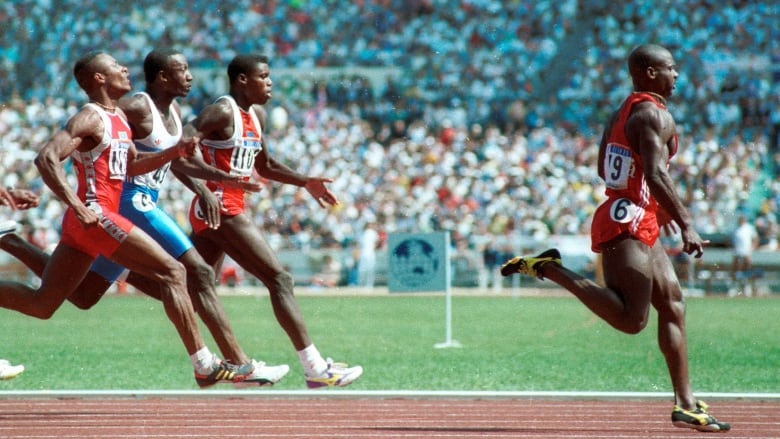The Current24:08Ben Johnson’s complicated legacy
<p>Ben Johnson maintains he was the victim of sabotage after a positive doping test stripped him of his Olympic gold medal in 1988. Galloway talks to Johnson and Mary Ormbsy — author of <em>World’s Fastest Man*</em> — about why they think the runner was mistreated as the scandal unfolded.</p>
Thirty-six years after he was stripped of an Olympic gold medal, former Canadian sprinter Ben Johnson still believes he has a place among the greats.
“In my mind and many [people’s minds] who supported Ben Johnson over the years … I’m the best 100-metre sprinter, and so be it,” he told The Current‘s Matt Galloway.
Johnson should have been on top of the world when he won gold in the 100-metre sprint at the 1988 Summer Olympics, setting a record time of 9.79 seconds.
But just three days after the race, Park Jong-sei of the Olympic Doping Control Center found that Johnson’s urine sample contained the anabolic steroid stanozolol. It’s a drug that gives users increased strength and allows them to recover faster from exercise.
Johnson was disqualified, had his gold medal stripped away and his record time erased from history.
“My mom’s always said to me over the years that the only way they can beat you is in a lab,” he said.
Johnson has admitted to using anabolic steroids, though not stanozolol. His steroid scandal is being revisited in a new book, World’s Fastest Man*: The Incredible Life of Ben Johnson, by Canadian sports journalist Mary Ormsby.
Ormsby, who covered the 100m race on Sept. 24, 1988, in Seoul, South Korea, for the Toronto Star, said she was shocked when her editor informed her of a wire story a few days later about Johnson testing positive.
“Until that point, for several years, there weren’t a lot of people being caught [for doping] on the world stage,” she told Galloway. “Certainly not at a high level, not famous athletes like Ben Johnson.”
‘A sad moment’ for family
Johnson was a national hero after he crossed the finish line in the 100m race. Brian Mulroney, Canada’s prime minister at the time, congratulated Johnson over the phone after the victory, and publicly referred to Johnson’s gold medal win as “a marvellous evening for Canada.”
But just days later, the nation’s tone had changed, Ormsby said. In the face of the doping allegations, Johnson faced a “very racist backlash” that painted him as an ungrateful immigrant from Jamaica who should return to his birth country.
“This really exposed a very ugly underbelly of Canadian sentiment,” she said.
WATCH | Ben Johnson on the moment he was told he had tested positive for steroids:
The former Canadian sprinter tells The Current’s Matt Galloway about the moment his coach told him he tested positive for the anabolic steroid stanozolol, not long after winning gold in the 100m sprint at the 1988 Summer Olympics.
In a cartoon at the time that Ormsby says was published in the Kingston Whig-Standard, Johnson was identified as Canadian, then Jamaican-Canadian, then Jamaican over three identical images of him.
“There was a lot of references to Jamaica, which is a dogwhistle for ‘This Black guy let us down. Can you believe it?'” Ormsby said.
The fallout was difficult for Johnson and his family. He said his nieces and nephews had to deal with snide remarks at school, and his dad felt the Canadian government should have protected his son.
“That never happened,” Johnson said. “That really hurt, and it also hurt me because I love this country. I came here to [do] the best I can — not only for my mother, but for the country that I love and I run for, even though I’m Jamaican.”

The scandal was particularly trying for his mother, Johnson said. He had a close relationship with her, and she was with him when officials came to take away his gold medal.
“It was kind of a sad moment,” he said. “But I know my mom looked in my eyes, and she told me that, you know, ‘Go with God, and things are going to be OK, son.'”
Steroids in the 1980s
It was Johnson’s coach, Charlie Francis, who raised the idea of taking steroids. Johnson says he agreed to do so because “I was told that everybody in track and field on that level was using performance-enhancing drugs.”
Johnson said the drugs don’t make sprinters run quicker, but rather help you “to train harder so you can recover fast.”
WATCH | The moment officials took back Ben Johnson’s gold medal:
The Olympic sprinter tells The Current’s Matt Galloway about being with his mother during the ‘sad moment’ when, following a positive drug test, officials came to take away the gold medal he had won for Canada at the 1988 Summer Olympics.
According to Dick Pound, a Canadian Olympic Committee executive member since 1968, that was a selling point for most runners.
“If you’re using steroids, not only were you getting the physical body changes, you were also acquiring the ability to do more workouts,” he told The Current.
“If you’re bigger and stronger as well, the thrust you can generate when you’re running … also adds to the performance.”
Pound was the vice-president of the International Olympic Committee (IOC) when Johnson tested positive. As a lawyer, he tried to defend Johnson during the athlete’s hearing before the IOC’s medical commission members in 1988. Ormsby doesn’t think Johnson got due process in that hearing.
Pound says steroid use was pretty well-known in sports before Johnson came onto the scene, and calls attempts to use its prevalence as an excuse a “convenient generalization.”
He said steroids have serious health risks, including liver and blood pressure damage, and it’s best to discourage their use before the risks become too real.
“Competitive sport being what it is, if I understand that you’re taking five milligrams of whatever the prohibited substance is … I don’t take five milligrams so that I level the playing field. I take 10, [because] I want to beat you,” Pound said. “And you find if I’m taking 10, you increase your dose to 15.”
“It’s not long before … you’re getting up to levels that are toxic.”
Although Pound believes Johnson was “misguided” in taking steroids, he says he was a “very, very talented runner” and the successor to 1964 bronze medallist Harry Jerome.
Johnson is adamant his talents come from the work he put in, not the steroids he took.
“I just trained hard and dedicated my life to track and field. And I spent my whole life running, so I have to see some results in the end,” he said.







